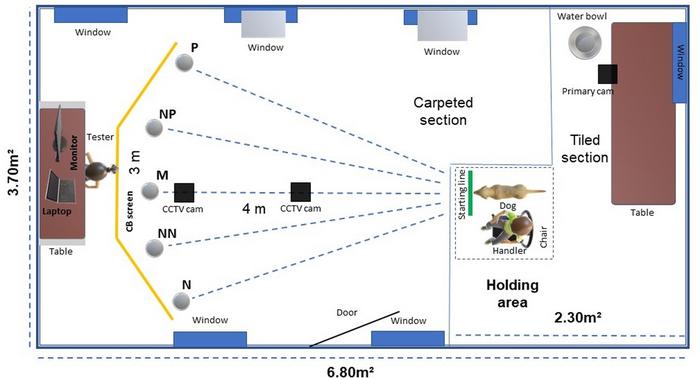A recent study published in PLOS One has unveiled fascinating insights into the cognitive and emotional characteristics of medical detection dogs and their subsequent performance on detection tasks. Conducted by Sharyn Bistre Dabbah and her colleagues, this research marks a significant leap in our understanding of how behavioral traits can influence the efficacy of these remarkable animals. The findings indicate a noteworthy correlation between a dog’s optimism, as assessed through judgment bias tests, and its overall capability in detecting specific scents.
Judgment bias testing has been an integral part of animal behavior research, as it provides a window into the emotional states of various species. In this study, the researchers employed a method where dogs were trained to associate distinct areas within an experimental room with the presence or absence of food rewards. The dogs exhibited varying responses when presented with intermediate locations, which served as indicators of their emotional outlook. Those dogs that displayed a tendency to approach ambiguous cues swiftly, characterized as “optimistic,” consistently performed better on detection tasks, potentially hinting at a connection between emotional positivity and task effectiveness.
In a unique twist, the research also highlights that while optimism generally correlated with improved performance, the fully trained medical detection dogs that exhibited more “pessimistic” tendencies showcased heightened specificity in their detection tasks. This nuanced finding suggests that different emotional states may affect dogs’ approach to scent detection in diverse ways, prompting a reevaluation of how trainers perceive and select candidates for medical detection roles.
The study’s cohort consisted of 27 trained medical detection dogs and 39 dogs still in training. Through careful analysis of their behavior on judgment bias tests alongside performance metrics on diverse detection tasks, the researchers found compelling evidence that certain characteristics, such as age and behavioral assessment scores, contributed to the dogs’ abilities. Older dogs and those demonstrating greater confidence, food orientation, and playfulness not only performed better overall but also revealed insights about the interplay between an animal’s emotional health and its scent detection capabilities.
However, the findings from this exploratory study come with a caveat; while correlations were established, the research does not definitively prove cause-and-effect relationships. Future studies are warranted to further dissect the interplay between a dog’s cognitive-emotional framework and its operational efficacy in detection scenarios. These associations might pave the way for innovative training methodologies and selection criteria that prioritize emotional and cognitive profiling, ultimately leading to enhanced outcomes in medical detection tasks.
The implications of this research extend beyond mere performance metrics. The insights gained may inspire new training techniques that integrate an understanding of "optimism" and "pessimism" in dogs. If trainers can identify and cultivate traits associated with positive emotional states, they may optimize training regimens that take advantage of these characteristics, potentially increasing the success rate of medical detection dogs across varied environments.
The authors acknowledge potential limitations within their study, particularly regarding the interpretation of optimism and pessimism in the context of canine behavior. Nonetheless, the unique approach of employing judgment bias tests introduces an exciting dimension to our understanding of canine cognition. As awareness about the emotional health and cognitive complexity of dogs grows, it becomes increasingly clear that such factors play a crucial role in their work as detection animals.
The study is timely, given the rising interest in the use of dogs in medical detection roles, especially in light of their proven capabilities in tracing diseases like cancer and diabetes-related conditions. Understanding the emotional and cognitive attributes that drive performance can enhance not only the training but also the welfare of these remarkable animals.
In a heartfelt conclusion, the authors emphasized the importance of considering emotional perspectives when training medical detection dogs. They advocated for the inclusion of behavioral assessments in the training processes, noting that a dog’s disposition could significantly influence its efficiency and effectiveness in real-world applications.
The researchers aim to draw attention to the complex relationship between emotion, cognition, and task performance, proposing that future studies incorporate broader samples and investigate the subtleties of dog behavior in different contexts. As the realm of animal behavior research continues to expand, this study shines a light on the potential for understanding and elevating the roles of dogs in critical tasks through the lens of their emotional and cognitive well-being.
Ultimately, a deeper understanding and application of this research could set the stage for significant advancements in the way medical detection dogs are trained, ultimately benefiting not just the animals themselves but also the communities that rely on their specialized skills. The intersection of animal welfare and utility presents a fascinating pathway for future exploration and innovation within this field.
Subject of Research: Animals
Article Title: An exploratory study of associations between judgement bias, demographic and behavioural characteristics, and detection task performance in medical detection dogs
News Publication Date: 9-Apr-2025
Web References: PLOS One
References: Bistre Dabbah S, Mendl M, Guest C, Rooney NJ (2025) An exploratory study of associations between judgement bias, demographic and behavioural characteristics, and detection task performance in medical detection dogs. PLoS ONE 20(4): e0320158.
Image Credits: Credit: Bistre Dabbah et al., 2025, PLOS One, CC-BY 4.0
Keywords: medical detection dogs, judgment bias, canine behavior, optimism, pessimism, emotional health, animal training, scent detection, PLOS One.




